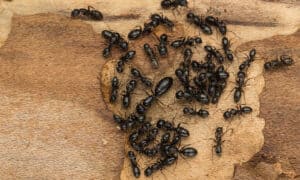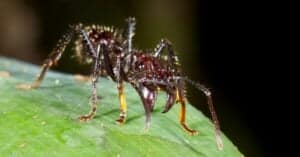Ants are some of the smallest animals in the world, with most being only five to 15mm long, although some can be even smaller. Therefore, you might be asking yourself the question, “Do ants have brains?”. Ants are widely known for living in huge colonies with a unique social structure, but how do they function and are they actually smart? Let’s find out!
All About Ants
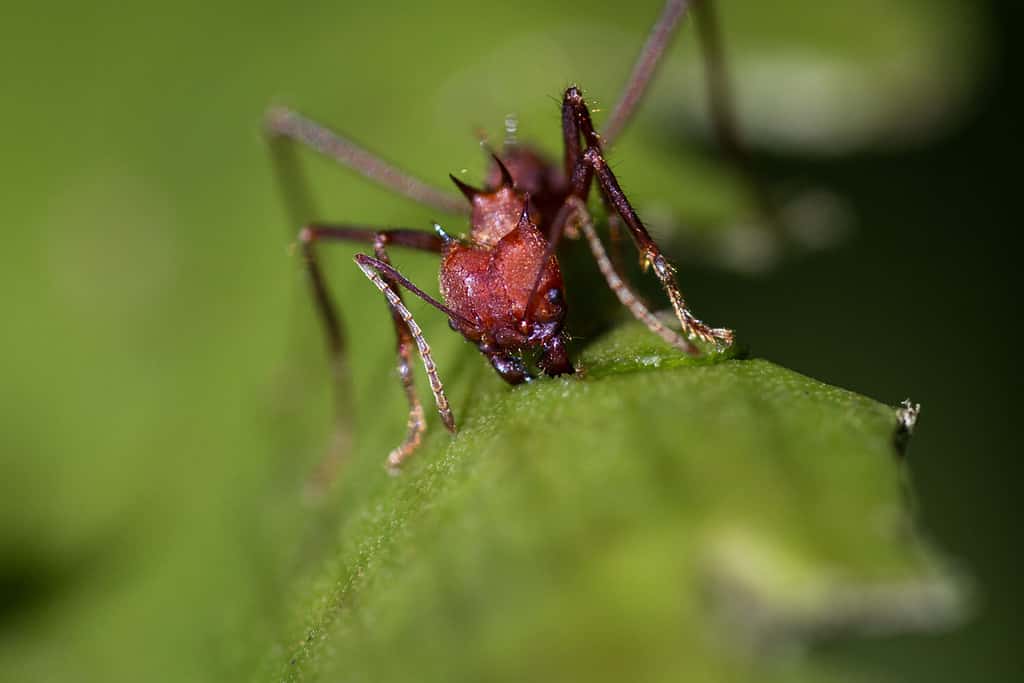
There are approximately 20,000 species of ants in the world.
©Nature’s Charm/Shutterstock.com
Ants are members of the Formicidae family group. There are approximately 13,000 known species, although it is estimated that there are around 20,000 species in total. Ants are eusocial insects and exhibit a high degree of social organization. They live in large colonies which can typically consist of anything between 20,000 and 100,000 individuals.
Ants live on every continent except Antarctica. They can live in a wide variety of habitats, including urban areas, rainforests, and even in deserts. Ant colonies typically live in nests deep underground or in the hollow areas of trees. Although some species of ants can live for up to seven years (longer for queens) they do have a wide variety of predators. Predators of ants include birds, mammals, insects, spiders, reptiles, and amphibians.
Do Ants Have Brains?
Yes, ants have brains! Despite their small size, researchers believe that ants actually have the largest brains amongst insects. In fact, they even have one of the largest brain-to-body ratios at 1:7. In comparison, humans have a ratio of 1:40. However, although they have a large brain relative to their body size, ants brains only contain 250,000 neurons (nerve cells), while human brains contain 86 billion neurons.
How Smart are Ants?
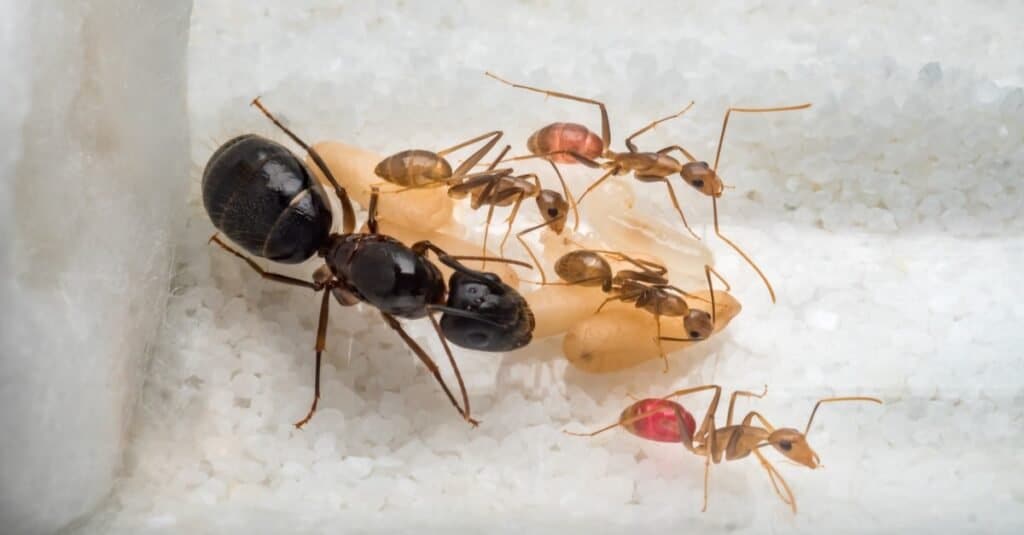
Worker ants are responsible for taking care of the queen and the larvae.
©Poravute Siriphiroon/Shutterstock.com
Ants have a small brain when we’re talking about relative size compared to a human. However, it doesn’t mean that they are dumb — far from it actually! Ants actually rank as some of the most intelligent insects in the world, with only bees ranked higher. However, ants don’t display much intelligence on an individual level, but collectively they are able to perform a wide variety of complex tasks. In short, individual ants are often described as being like a single cell in a human, while the colony is like the entire body.
Ants are highly organized animals. They can work together to achieve tasks such as nest building, foraging for food, and defending their colony. They are also able to communicate with each other using pheromones. These are chemical trails that they can detect with their sensory organ.
As we mentioned earlier, ants live in large colonies and these are organized by social structure and hierarchy. There is a queen who is responsible for the reproduction of the colony, males who die shortly after mating, and worker ants.
The worker ants are females which are smaller than the queen but are unable to reproduce. They are the most fascinating members of the colony. This is because they are responsible for carrying out the day-to-day tasks which ensure the survival of the colony. Quite often these roles are divided out amongst the workforce so that individuals mainly only focus on one task and the work is divided equally between members of the colony.
Nest
Making and maintaining the nest is an important role of the worker ants and another example of their intelligence. The nests consist of several different chambers with tunnels to connect them, and it is the responsibility of the worker ants to create them. They are also responsible for carrying out any repairs that may be needed to keep the nest in a good condition.
Food
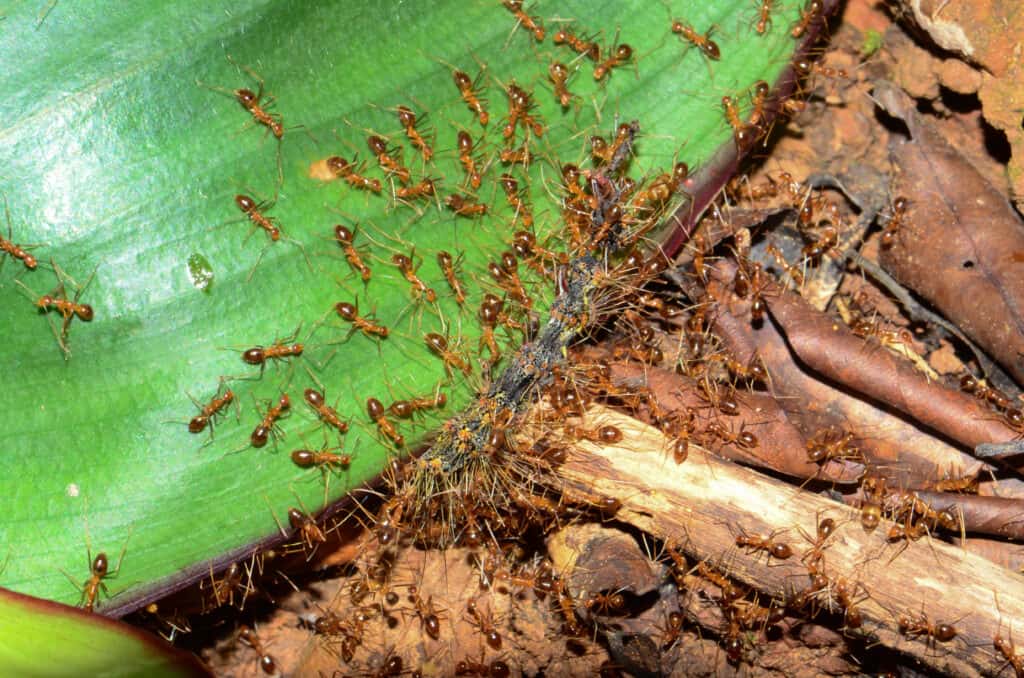
Ants eat a wide variety of insects, fruit, and sap from trees.
©demonhero69/Shutterstock.com
Another main role of the worker ant is to forage for food. Ants eat a wide variety of food, including insects, fruit, and the sap from trees. Although the worker ants collect the food and transport it back to the nest for distribution and storage, they are also responsible for feeding the queen. Once the queen is established in her nest she does not ever venture outside again, relying solely on the care of her workers. The worker ants bring her food and clean her too. Also, although it is only the queen that can reproduce, the worker ants are the ones that are responsible for looking after the larvae by bringing them food too.
Defense
Finally, the worker ants are also responsible for defending the colony. When a threat is detected ants can release alarm pheromones. These warn the other members of the colony but also summon the other ants to the place that needs to be defended. Ants will work together to defend their colony by biting, stinging, or spraying acid at the attacker. Ants in the aptly named species, Colobopsis explodens, may also “self-sacrifice” to protect their colony from the intruder. This involves them releasing a toxin from their abdomen. This will kill the intruder but also kills them in the process.
The photo featured at the top of this post is © Kras_Stock/Shutterstock.com
Thank you for reading! Have some feedback for us? Contact the AZ Animals editorial team.





